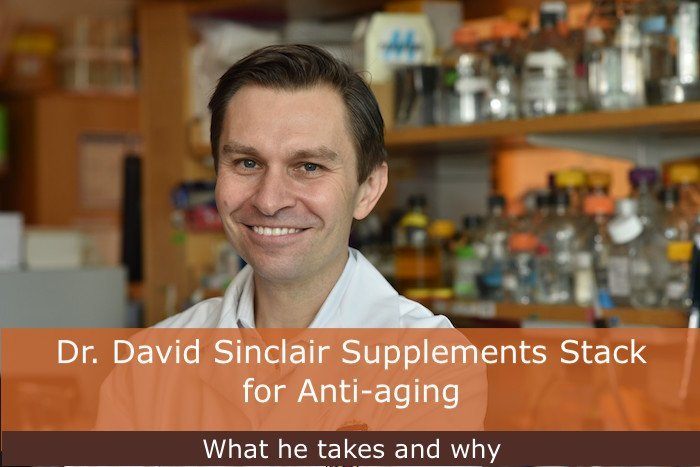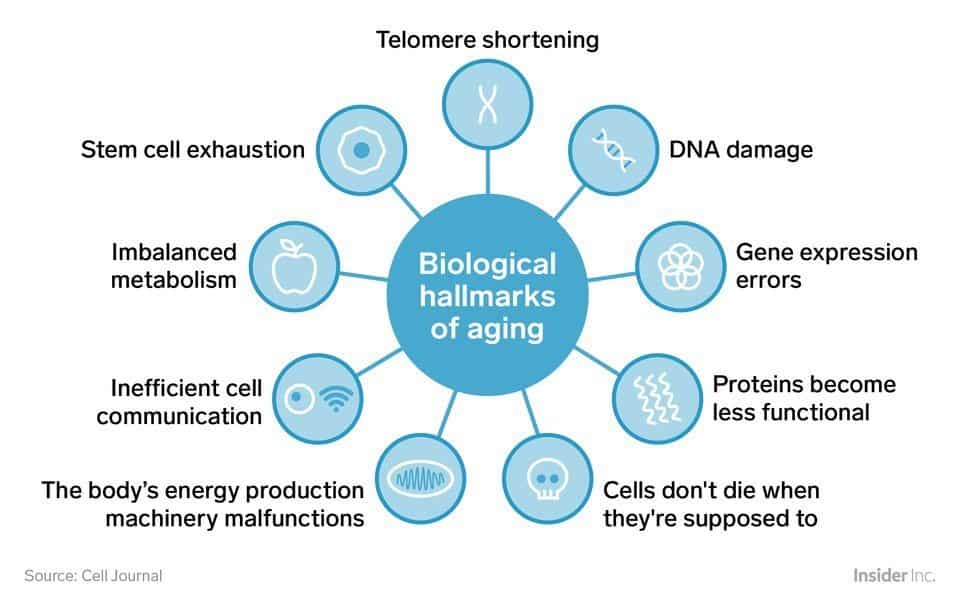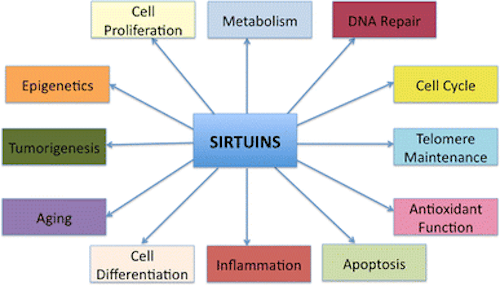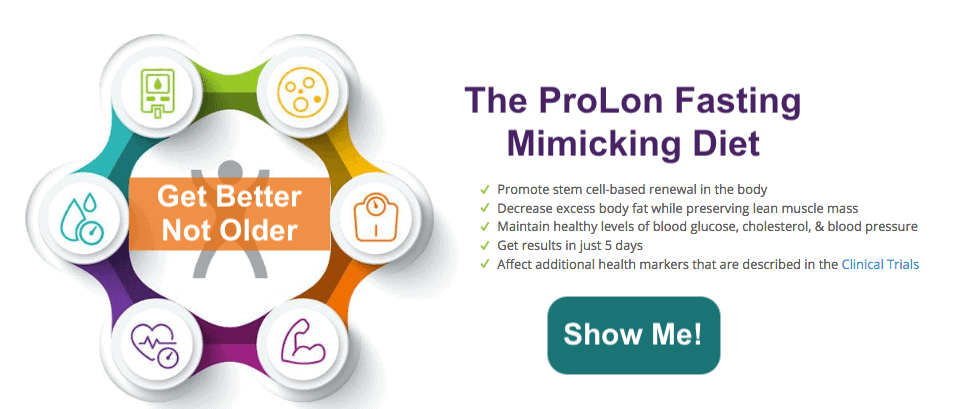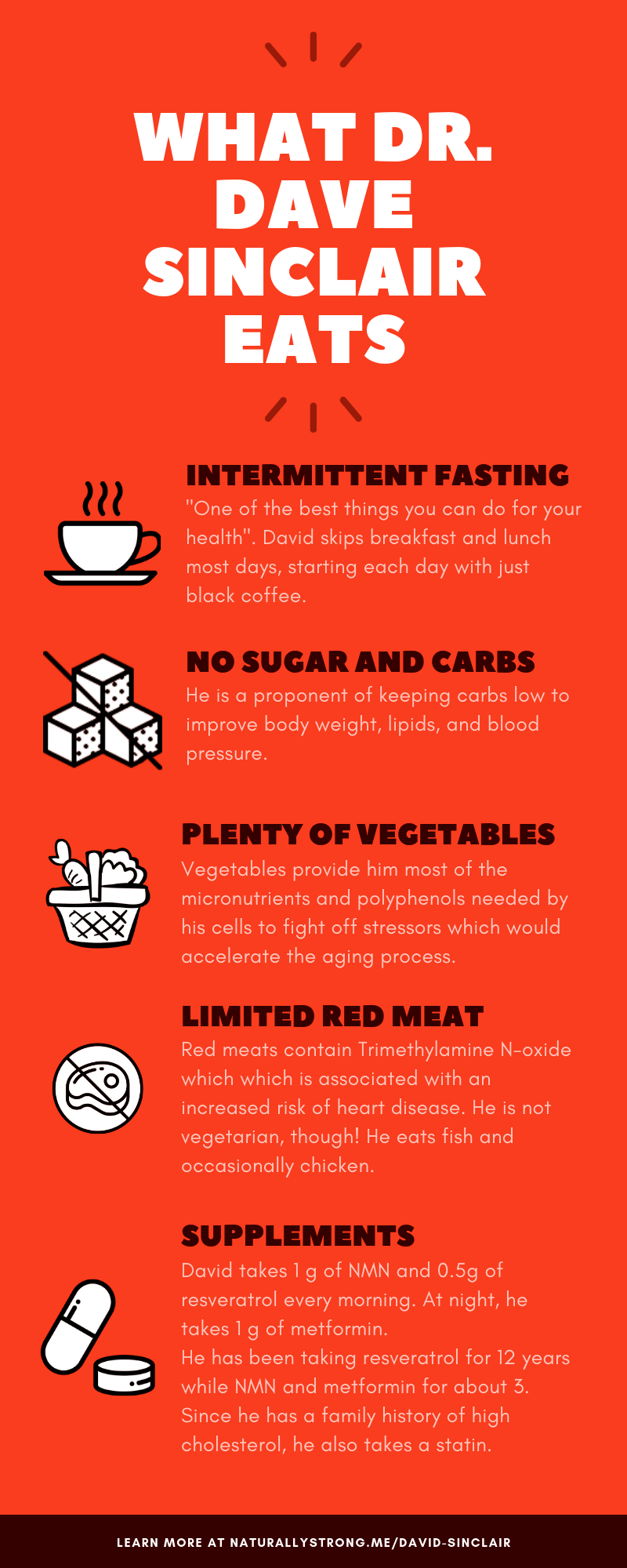Dr. David Sinclair Supplements For A Long and Healthy Life
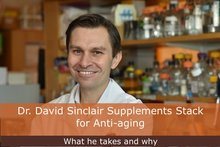
Dr. David Sinclair supplements with compounds that are shown to be effective in his anti-aging research. Learn about his Information Theory of Aging and what supplements and foods he consumes to optimize the functioning of three primary longevity cellular pathways.
It seems that everybody interested in extending their lifespan wants to know what Dr. David Sinclair supplements with, given that he’s among the preeminent longevity researchers in the world.
David Sinclair, PhD, is a professor of genetics and a codirector of the Paul F. Glenn Center for Biology of Aging Research at Harvard Medical School. His research has given us a deeper understanding of how we age, and how to slow down various aging processes. He is the author of Lifespan, a book I reviewed in my post, Lifespan: The Book and Age-defying Lifestyle of Dr. David Sinclair.
I recently listened to an interview that Goop’s Elise Loehnen conducted with Dr. David Sinclair and thought my summary of it, along with more information about aging better, would be helpful for you to focus on specific things you can do now — things that are within the span of your control — to improve your healthspan, the years over which you’re healthy.
The fundamental perspective of Dr. Sinclair and other researchers of his ilk is that aging is a disease that medical practitioners need to learn how to treat. They’re getting close, given the many breakthroughs scientists are discovering, some of which I will cover here, including David Sinclair’s supplements.
David Sinclair’s Information Theory of Aging
As far as I can tell, Dr. Sinclair’s Information Theory of Aging seeks to explain much of the “Hallmarks” through the prism of the genetic and epigenetic information in our body’s cells. Genetic information is DNA (collectively, the “genome”), which is the unalterable genetic instructions for the development, functioning, growth and reproduction of all known organisms and many viruses. Epigenetic information, however, refers to external modifications to DNA that turn genes “on” or “off.” These modifications do not change the DNA sequence.
These epigenetic “external modifications” are chemical changes that are influenced by our environment; meaning, how we live our lives, if we’ve been fasting or exercising, or over-eating and inactive, and so on. These environmental or lifestyle factors slows down or accelerates the ticking of an epigenetic clock that heavily influences how you age.
Dr. Sinclair’s lab determined that epigenetic information is probably more important for our long-term survival than the actual genome itself, although both are essential. To make this point relatable, in his book Sinclair uses the metaphor of digital and analog records as a way of describing the relative permanence of the genome and epigenome.
Epigenetic information is lost more quickly than genetic information because genetics are a digital record, whereas epigenetics are an analog record. Remember those vinyls and cassettes? They’re analog — adept at storing information in the short-run, but they degrade over time compared to digital recordings. And so, by the time we’re, say, eighty years old, our cells have lost the ability to read the right genes at the right time. They forget to be the kind of cells that they were when they were young, and that’s how we get diseases that go hand-in-hand with aging.
This begs the question, How can we get more use out of our analog-based epigenome? The answer may lie in certain longevity pathways.
The Three Main Longevity Pathways
There are three main longevity pathways:
- Sirtuins, a family of signaling proteins involved in metabolic regulation that respond to environmental inputs;
- mTOR (mechanistic target of rapamycin), a protein kinase (an enzyme that modifies other proteins) that regulates cell growth and metabolism, and thereby registers how much protein you’ve been eating; and
- AMPK (adenosine 5′ monophosphate-activated protein kinase), an enzyme that plays a major role in cellular energy homeostasis, largely to activate glucose and fatty acid uptake and oxidation when cellular energy is low, thereby determining the body’s balance between energy consumption and production.
Activating sirtuins and AMPK, and deactivating mTOR can provide health benefits that slow down aging.
Upregulate Sirtuins
Dr. Sinclair’s lab primarily works with the sirtuin pathway. In mammals like us there are seven sirtuin genes that respond to the environment and protect the epigenome. When we activate these sirtuins, either with certain lifestyle inputs or natural molecules, we get improved health and longevity in old age.
Hunger brought on by fasting and intermittent fasting, exercising, or losing your breath via high intensity interval training (HIIT) makes the sirtuin genes more active. This underscores the concept and value of “hormesis”, the principal commonly defined as a beneficial or stimulatory effect caused by exposure to low doses of an agent known to be toxic at higher doses.
Within the hormetic zone, there is generally a favorable biological response to low exposures to toxins and other stressors:
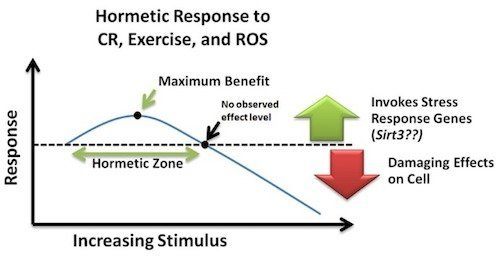
Hormetic response curve. Within the hormetic zone, mild or moderate doses of ROS, calorie restriction, and exercise may increase stress resistance and promote cell survival by invoking transcription of stress response genes such as Sirt3. Alternatively, high levels of cellular stress can cause damaging effects leading to cell death. NOEL, no observed effect level; CR, calorie restriction; ROS, reactive oxygen species. (Credit: Researchgate.net)
Basically, hormesis posits that anything that doesn’t kill you makes you live longer. Even small but frequent bouts of being hungry and breathless exercise is sufficient to activate sirtuins.
There’s also evidence that exposing your body to cold and heat activates those same pathways. Specifically, the sirtuin-3 gene gets activated by cold, which promotes the browning of fat, which is thought to be beneficial to health.
Brown fat is full of mitochondria that use energy and speed up the metabolism. This is beneficial because it reduces body fat in general, and the browning seems to produce healthy protein signals. It’s been shown that you can make white fat turn brownish or beige by being cold.
White fat is detrimental to your health, especially around your organs, whereas brown fat under the skin is healthier. The older you get, the harder it is to make brown fat, so don’t wait to make snow angles or take cold baths and showers. You can also get cold by wearing less clothing when outside and sleep with fewer blankets.
We know from mice studies that if we manipulate the systems that control body temperature, we can make them live longer, and although you’re not a mouse, humans share nearly 90% of our DNA with them.And while you’re at it, seek out a dry sauna to get yourself hot. Longevity expert Dr. Rhonda Patrick has long extolled the ability of saunas to dramatically improve heart health outcomes and general healthspan (watch her), and to induce hyperthermic conditioning that can dramatically improve various chronic health conditions.
In one study from Finland, people who spent between four and seven days a week in a sauna had a twofold reduction in fatal cardiovascular events and all-cause mortality. We don’t know exactly how the heat works, but Dr. Sinclair thinks that heat probably turning on the same defenses that all of these other stressors do. If you turn up the temperature on a yeast cell, it will activate the sirtuins, and they will live longer as a result. The same processes may occur in our bodies as well.
Some of the sirtuins respond to cold, some respond to diet, and some respond to DNA damage. Do a variety of things that stir the sirtuins from their complacency and get them to work harder.
Dr. Sinclair says that it’s insufficient to do just one of thing, such as allowing yourself to go hungry from time to time or being cold. The combination of all of these sirtuin activators is the key, he says, which is why he does them all.
Downregulate mTOR
You want to upregulate (stimulate) sirtuins; the opposite is true with mTOR.
mTOR controls growth in response to nutrients (such as amino acids), growth factors (such as insulin, insulin-like growth factor [IGF]-1), and cellular energy (ATP). When activated, mTOR is responsible to help you grow and reproduce. This is good when you’re growing and in the reproductive years of your life, but not good when the aim is to extend healthspan, if not lifespan.
mTOR inhibitors are currently the only known pharmacological intervention that increases lifespan in all experimental animal models tested. This is because when mTOR is inhibited, the body can move from a growth cycle to a clean up cycle, wherein they can engage in autophagy to clean out damaged cells in order to regenerate newer, healthier cells.
A growing list of evidence suggests that mTOR signaling influences longevity and aging. Inhibition of the mTOR complex 1 (mTORC1) with rapamycin is currently the only known pharmacological treatment that increases lifespan in all model organisms studied. But taking rapamycin can be dangerous, particularly if you’re not consistently monitored, so consider safer way to inhibit mTOR.
And what are they, you may wonder?
Michael Greger, MD suggests that you don’t have to severely restrict caloric intake to inhibit mTOR, although that works well (and Dr. Valter Longo’s Fasting Mimicking Diet can do the job without you getting too hungry). What you can do instead to attenuate overall TOR activity is to:
- Reduce animal protein intake
- Eat more plant-foods, especially cruciferous vegetables
- Eat specific mTOR inhibitors, such as broccoli, green tea, soy, turmeric, and grapes, along with other fruits and vegetables such as onions, strawberries, blueberries, mangoes and the skin of cucumbers
To this list, Frank Lipman, MD suggests these supplements, some of which you’ll soon see are those that David Sinclair supplements with:
Update (9/20/21): There's some controversy about the benefits of resveratrol. If you currently use resveratrol, or are considering it, make sure you read my update.
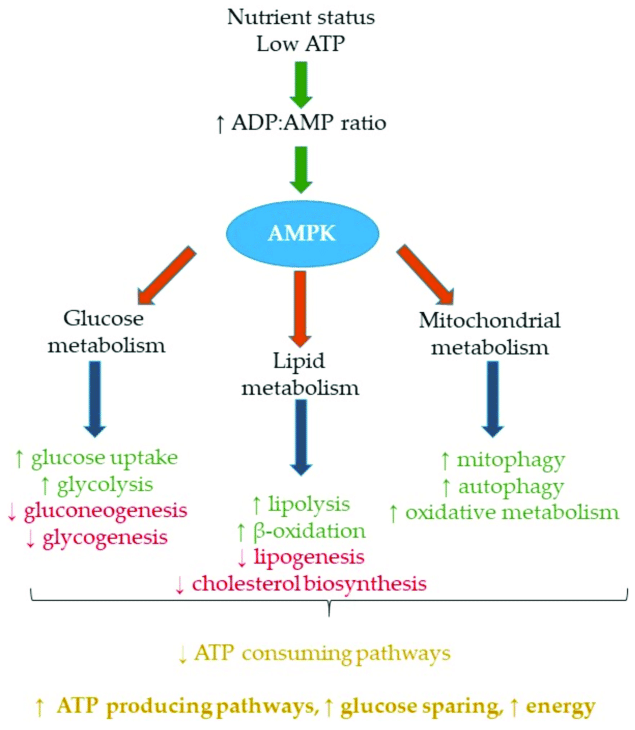
The role of AMP-Activated Protein Kinase (AMPK) on whole-body metabolism. AMPK is a nutrient sensor, which is activated in response to low adenosine triphosphate (ATP) levels, and an increased adenosine diphosphate: adenosine monophosphate (ADP:AMP) ratio. As a result, it activates pathways that produce ATP through glucose, lipid and mitochondrial metabolism pathways, thus increasing ATP levels. Conversely, pathways that deplete ATP are inhibited by AMPK. An ↑ arrow represents an upregulation of the process and ↓ represents a downregulation of the process. AMPK = AMP-Activated Protein Kinase, ATP = Adenosine triphosphate, ADP = Adenosine diphosphate, AMP = Adenosine monophosphate. (Credit: Researchgate.net)
As mentioned, AMPK activates glucose and fatty acid uptake and oxidation when cellular energy is low, thereby determining the body’s balance between energy consumption and production. As such, AMPK has been referred to as a “metabolic master switch.”
The primary role of AMPK is to sense each cell’s energy status all the time, and to trigger responses that maintain the cell’s energy at an optimum level. This is a balancing act: too little available energy starves the cell; too much energy can exhaust and disrupt cellular components. It’s inefficient for cellular energy to be too high or too low, and this energy inefficiency ultimately leads to the dysfunctions medical researchers identify as the diseases (or symptoms) of aging.
Activated AMPK promotes all the processes we want to maintain a youthful profile: rapid, efficient release of energy, with little energy storage as fat or new sugar molecules. Thus, activated AMPK keeps us lean and active, with a steady renewal of cellular components. However, like many good things, AMPK activity fades with age.
Just as with activating sirtuins or deactivating mTOR, you can boost AMPK activity through exercise, calorie restriction and supplementation:
- HIIT
- ProLon
- Intermittent Fasting
- AMPK Metabolic Activator
- Berberine
- Quercetin
- Alpha lipoic acid
- Trans-Resveratrol
Again, notice that all three of the longevity pathways covered here are optimized by exercise, going hungry from time to time, and the use of supplements, including David Sinclair supplements, which I next address.
Dr. David Sinclair Supplements and Foods To Extend Healthspan
Dr. Sinclair research guides his supplementation. He and other scientists have discovered some molecules that may make both mice and humans healthy and live longer. One is resveratrol (trans-resveratrol to be more specific) which he’s been taking for the past 12 years.
Trans-resveratrol has been shown in clinical trials in humans to improve blood sugar levels and reduce inflammation.
Another David Sinclair supplement is NMN (nicotinamide mononucleotide), a Vitamin B3 (niacin) derivative and NAD booster (Nicotinamide adenine dinucleotide).
NAD is a coenzyme central to metabolism, and found in all living cells. It’s the fuel for the sirtuin enzymes. In mice, it has been shown to mimic exercise and fasting and clinical trials have so far show that boosting NAD probably has the same effect in humans.
The third molecule, Metformin, was developed for type 2 diabetes but is increasingly thought to protect against cancer, heart disease, and potentially even Alzheimer’s because it turns on the AMPK pathway related to cellular energy homeostasis (one of the three longevity pathways I mentioned above).
Besides supplements, Dr. Sinclair emphasizes the importance of consuming the right food to enhance healthspan. He’s a proponent of the dietary lifestyle of those living in the “Blue Zones“, where people eat fewer than three meals a day (he believes a diet of eating three meals a day plus snacks is killing us), are more active, and live longer.
People in the Blue Zones tend to eat very little meat, a lot of plant food, drink a glass of red wine each day, and move their bodies a lot. They also consume more resveratrol than most people.
Resveratrol and a larger family of plant molecules activate the sirtuins. Plants make these molecules when they are stressed out, like when they don’t get enough water, nutrients, or sunlight. It could be that when we eat plants that have been stressed just before picking, we get the health benefits of these resveratrol-like molecules.
Stressed plants make xenohormetic molecules that increase stress tolerance so that they can survive. When those stressed plants are eaten, our body get the signal that our food supply might run out, and reacts as if it needs to go into survival mode. Eating these xenohormetic molecules is what gives the people in the Blue Zones long, healthy lives.
Colored plants and organic foods that have not been kept under perfect conditions are high in resveratrol and other molecules like it, such as pterostilbene. Deep-colored wines have the most resveratrol. Most people think that it’s the antioxidants in these fruits and vegetables that are good for us, but Dr. Sinclair thinks that the most important thing is these xenohormetic molecules that the plants are making.
Dr. Sinclair’s lab took the resveratrol discovery all the way to human trials and effectively treated psoriasis in the skin. For the past two years, he’s been running clinical trials on the NAD booster NMN at Harvard. So far, he has safety data to show that NAD boosters are safe in short-term studies, but more on this work will be published in the next year.
Last year, Dr. Sinclair published results showing that when you give NMN to a mouse:
- Some of its body gets younger,
- It acts as an exercise mimic, in terms of the benefits of exercise, and
- The older mice could run up to twice as far.
So, to sum up David Sinclair supplements and food, he:
- Eats very little meat
- Eats a lot of plant-based food
- Eats twice a day, skipping breakfast
- Exercises regularly
- Supplements with
- Trans-resveratrol, 500 mg
- NMN, 1,000 mg/day
- Metformin 1,000 mg/day
Your Takeaway On David Sinclair Supplements
Here’s what you need to remember.
There are three main longevity pathways that substantially affect your healthspan. The two you want to stimulate are Sirtuins and AMPX. The one you want to inhibit is mTOR.
You can help all three longevity pathways to help you live a long and healthy life by:
- Allowing yourself to go hungry on a routine basis, such as practicing intermttent fasting, or doing ProLon a few times a year.
- Eating a plant-dominate diet
- Making yourself breathless with exercise on a consistent basis
- Geting cold, getting hot
- Supplementing with some of these:
- NAD boosters (NMN, NR),
- Trans-resveratrol
- Alpha lipoic acid
- Quercetin
- Fish oil
- Metformin, if you have high blood sugar and can get a prescription from your doctor
Before you go...
Last Updated on April 25, 2022 by Joe Garma

